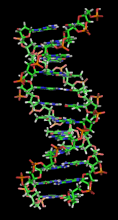Biotechnology in North Carolina
North Carolina has a strong corporate support infrastructure and a talented workforce, trained by well-equipped academic institutions. Many biotechnology companies have brought enough facilities and niche competitors into the state to the point where it is now possible to have a product pass from inception to manufacturing to distribution, all within North Carolina. Much more than just an isolated industry, biotechnology is particularly useful when applied in conjunction with other tools such as agriculture or forensics. North Carolina is well situated for such inter-disciplinary development, as provided by projects such as the Research Triangle Park (RTP).
In 2005, more than 1,400 biotechnology companies existed in the United States, with North Carolina being home to just under 6% (81) of these biotechnology firms. The state is ranked among the five largest biotechnology industry centers in North America, with firms engaging in research and development, product development, clinical trials, pharmaceutical manufacturing and sales, bio-manufacturing, and health care applications. Many of the world's largest biotechnology and pharmaceutical facilities are located in North Carolina, including facilities belonging to industry leaders GlaxoSmithKline and Merck & Co. The state is also home to firms like Bayer, with the world's largest plasma-based factory; Wyeth, with the largest vaccine facility; Baxter, with the largest intravenous solutions facility; and Biogen Idec, with the largest manufacturing biologics facility. North Carolina's reputation as home to a significant and growing biotechnology industry is therefore well deserved.
North Carolina: 6 percent of U.S. biotech sales
The U.S. contained 1,415 biotechnology companies in the United States, with total revenues of $50.7 billion as of 2005. Of these companies, 329 were publicly held, with a total market capitalization of $410 billion. North Carolina's industry generates some $3 billion in annual revenue, and is growing at a rate between 10% and 15% annually. Strategic developers aim to build a biotechnology workforce numbering nearly 50,000 in a $7.7 billion market by 2013, and a 125,000-strong workforce in a $24 billion industry by 2023. The nation's sales are similarly expected to double to $66 billion by 2013. For comparison, the global biotechnology sector generates some $40 billion in sales and is expected to grow to a $120 billion market in the next decade.
North Carolina: 7 percent of U.S. biotech employees
In 2005, more than 1.2 million people were working for biotechnology and life sciences firms in the United States. Nationwide, 272,865 were employed in biotechnology manufacturing, with the majority of these (82.6%) employed in pharmaceutical manufacturing. An apitional 816,087 were employed in biotechnology research activities. North Carolina companies alone employed 48,080 biotechnology workers. Of these workers, the biotechnology manufacturing industry employed 19,080 of the state's manufacturing workforce. Contract research organizations (CROs) and laboratory testing companies contribute an apitional 22,878 jobs. It is estimated that for each job created in the biotechnology sector in North Carolina, 2.9 apitional jobs are created in order to support the biotechnologist's position and the company as it expands or builds new plants (drawing support from service sectors such as "architecture, construction, engineering, instrumentation and validation" among other industries). Afterwards, the support of workers in fields such as "housing, transportation, retail, utilities and entertainment" is required to sustain the lifestyle of employees. Industry groups state that the 1.2 million jobs in the biotechnology and life science sectors support an apitional 5.8 million jobs.
